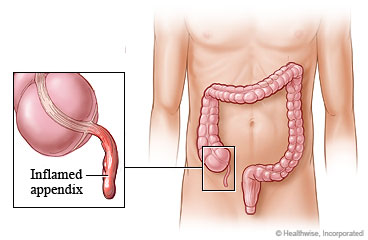Possible Appendicitis in Children: Care Instructions

Your Care Instructions
The appendix is a small sac that is shaped like a finger. It's attached to the large intestine. Appendicitis happens when the appendix gets infected and inflamed. The main symptom of appendicitis is belly pain. Your child may feel pain near their belly button. Then they might feel pain on the lower right side of their belly. But the pain can be in different parts of your child’s belly or even on their side or back. The pain may get worse if your child moves, walks, or coughs. They may also have a fever or feel sick to their stomach.
If your child has not been seen by a healthcare professional, and is experiencing either moderate belly pain that does not go away after 4 hours or severe belly pain, they need to be seen by a doctor and assessed for appendicitis.
If your child has been seen by a healthcare professional who thinks it’s possible that your child has appendicitis, they may want to order more tests. Or they may want to wait to see if the symptoms change.
If you go home and your child's symptoms continue or get worse, it's important to call your doctor or get medical care right away. Appendicitis can get serious very quickly. The main treatment is surgery to remove the appendix.
Follow-up care is a key part of your child's treatment and safety. Be sure to make and go to all appointments, and call your doctor or nurse advice line (811 in most provinces and territories) if your child is having problems. It's also a good idea to know your child's test results and keep a list of the medicines your child takes.
How can you care for your child at home?
- Do not let your child eat or drink, unless your doctor says it is okay. If your child needs surgery, it's best to have an empty stomach. If your child is thirsty, have your child rinse his or her mouth with water. Or your child can suck on hard candy.
- Follow the doctor's instructions about giving your child medicines. The doctor may tell you how to manage your child's pain or prescribe antibiotics for before or after surgery.
- Watch for symptoms of appendicitis. See the When should you call for help? section below. It is very important that you follow the doctor's instructions about getting treatment if your child has these symptoms.
When should you call for help?
Call your doctor or nurse advice line now or seek immediate medical care if:
- Your child has pain that becomes focused on one area of his or her belly.
- Your child has new or worse belly pain.
- Your child is vomiting.
- Your child has a fever.
- Your child cannot pass stools or gas.
Watch closely for changes in your child's health, and be sure to contact your doctor if:
- Your child does not get better as expected.
Where can you learn more?
Go to https://www.healthwise.net/patientEd
Enter K598 in the search box to learn more about "Possible Appendicitis in Children: Care Instructions".
Adaptation Date: 2/28/2022
Adapted By: Alberta Health Services
Adaptation Reviewed By: Alberta Health Services
